The American Revolution, also known as the American Revolutionary War or the American Revolutionary War (1775–83), was a war in which 13 of Britain's North American colonies won political freedom and eventually formed the United States of America. The war lasted for more than a decade with increased hostility between the British Crown and a large and influential segment of its North American colonies. Until early 1778, the conflict was a civil war within the British Empire, but afterwards it became an international war when France (1778) and Spain (1779) joined the colonies against Great Britain.

The cause of the American Revolution can be divided into three categories:
- Sociocultural (Enlightenment)
- Political
- financially
Sociocultural causes
company
The revolution had important social causes. The presence of Colonial legislators, the ideologies given by the Enlightenment philosophers, and also the good failure of care are united all the reasons for the revolution.
Legislators were allowed to levy taxes, assemble armies and pass laws. Over time, these powers became rights in the eyes of many colonists. When they were reduced by the British, the conflict arose. The long-term leaders of America were born in these legislatures. Several of the revolutionary leaders had studied the most important writings of the Enlightenment as well as Hobbes, John Locke, a philosopher, and also Baron DE Montesquieu. From these writings, the founders drew the ideas of the agreement, limited government, consent from those in power and the distribution of power. Although the British believed in mercantilism, Prime Minister Solon adopted a text of "curative care failure". (K. Martin) This was a system in which the social control of international trade relations was negligent. He believed this inflated freedom and would stimulate worldwide trade.
Cultural
Despite the fact that the colonists within the 13 colonies went through the period before the revolution, they still had cultural customs in their homes. Beliefs specified in culture played a major role in people's beliefs by inspiring people to rebel. A very important person at that time, who also impressed several to revolt, was a man named John Locke. His words of knowledge set standards and the need for a government that made people have a certain hope. He explained to people the right meaning of being liberal with his quote - "Power comes from the people". Around now, families and friends have gathered around to play board games that give them cheap salon recreation. Before and during the American Revolutionary War, faith (especially Catholicism) had a profound effect on the people. In the geographical region, the main religion was Catholicism. But everywhere, there have been completely different Protestant branches that play a serious role in their faith. Faith and religion made an impression at the beginning of the American Revolutionary War, and it has continued. It impressed people and told them that a revolution was "good" in God's eyes. Quotes that were usually told to people to get this faith went one thing like this “the seat of the glorious kingdom that Christ will raise up on earth in the last days. (PBS) »People looked up to leaders now for enlightenment, and these leaders inspired them to start a revolution. John Locke talked about how the goal of any government was to protect the freedom of the people, and if it is not done, then the people have the right to turn the table in their favor.
Political reasons
The American Revolution was also caused by some political issues, including the increase in control established by the British, the creation of discriminatory laws such as the Proclamation or Stamp Act. After winning the French and Indian wars, King George II wanted to be stricter with the British colonies. One main reason was the fact that the Indians still posed a threat to the British government, and secondly, the French and Indian wars, which lasted for seven years, cost Britain a lot of money. The king wanted the colonies to help pay for all these expenses. The first of several laws to achieve this was the 1763 proclamation forbidding the colonists from moving west past the Appalachian Mountains. In 1764, Britain passed a law preventing the colonies from printing and spending their own money. These and several other laws passed to tighten the English government in the colonies brought out much anger and frustration. But the one law that really angered the colonists was the Stamp Act of 1765, which taxed all kinds of printed paper from wills, licenses, newspapers, diplomas, even playing cards.
Let's understand some events in order:
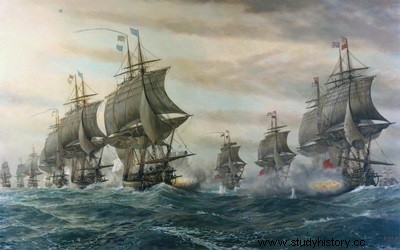
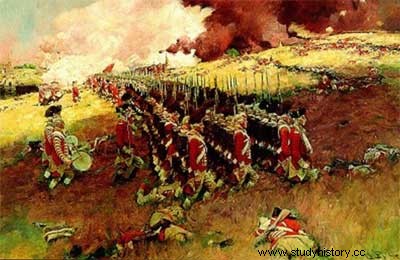
The 7-Year War (1754–1763)
Between Britain and France across territories in America:
- Spread to 5 continents
- India-3. carnatic war
- France defeated - lost most of the treaty
- The Treaty of Paris signed
The French and Indian War
France occupied most of Canada and the lakes until the late 1750s, but Britain settled in 13 colonies on the east coast. When George Washington, 22, was removed as Virginia's governor, the war officially began. As a French delegate, he warned against approaching Pittsburgh's location today. On their way back from a failed and unsuccessful mission, the French were captured in a French camp in Washington, so they signed with the Frenchman up Joseph Coulomb. Dejumon Viru is killed. In fear of revenge, Washington ordered the construction of a suitable Fort Nessé City. On July 3, 1754, the Battle of Fort Nessé (known as the Battle of the Great Pastures) became the first war with only General Washington. Surrender ... and Washington quickly defeated World War I and defeated General Edward Braddock and Governor William Shirley in Massachusetts, but both failed to stop the French. In 1756, William Pitt of England decided to set up a new business and begin financing the war strategy of the French Prussian army and its allies. The mine also repaid the colonies for traveling troops to defeat the French in North America.
British victory in the French and Indian War
Gambling went well. The first British conquest of Lewisburg in July 1758 weakened military morale. They quickly captured Fort Frontenac from the French army, and in September 1758 General John Forbes conquered Fort Dukane and rebuilt the British fortress named Fort Pitt. There, the French army lost the Battle of Quebec (also known as the Battle of the Plains of Abraham) in September 1759, and new British troops entered Quebec. Montreal collapsed in September the following year. British troops under George III did not just fight the United States. At the same time, they fought a naval battle to prove British strength, and after defeats in the battles of Lagos Bay and Quiberon in 1759, the French had to stop the British invasion. The British defeated French troops on January 16, 1761 in Guadeloupe, Martinique, Havana, Manila, West Africa and India, and fought against the French Pondicherry.
Treaty of Paris
The Treaty of Paris was signed on February 10, 1763, in which France, India and Great Britain occupied Canada, Louisiana and Florida (later Spain), eliminating European enemies and officially ending the war. The Paris Agreement returned Pondicherry to France, secured important colonies in the West Indies and Senegal, and Britain's victory in the Franco - Indian War made Britain a world power. The defeat of France then encouraged Britain to unite with its American allies during the Revolutionary War.
After the war
- The French threat to the colonies was gone.
- Britain went into huge debt.
- They planned to tax the colonists because the war would benefit them the most.
- Colonists were forbidden to settle in newly acquired land.
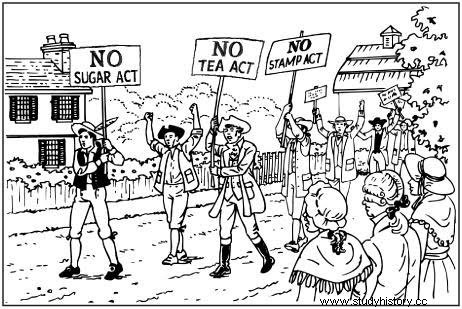
British Royal has doubled down on gilts to register for war with British and Dutch banks. George II claimed that the war between France and India was beneficial to the colonies to protect their borders and that they had to play a role in repaying the debt of the war. To protect the newly acquired country from future attacks, King George II also decided to establish a permanent British army in America, in order to increase revenues. In 1765, Congress passed the Stamp Duty Act to repay war debts and support Britain. The existence of American soldiers. This was strongly opposed in the first internal period that Congress directly attributed to the colonial pioneers in America. Then it grew up with unpopular city and housing laws that encouraged other colonies that thought there would be no taxes without their representatives. A correspondence committee was also formed to spread the message from people to people. The British military response to colonial unrest would eventually lead to the American Revolution. So, along with the abolition of stamps, the Declaration Act (1766) passed by the British Parliament gives the same powers to the British Parliament as in the United States and Great Britain. Then came the following-
Townshend Act 1767
- Charles Townshend Minister of Finance
- Suspended Legislature in New York
- Tax important goods - tea, paper, glass, paint, lead
- Power to the British authorities to search any building
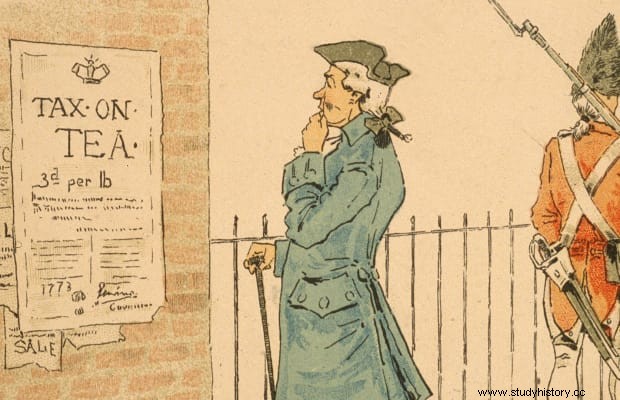
Then came the law of 1773
- Lord North, the new Prime Minister of the United Kingdom, removed all taxes except on the TEA (mainly in favor of the EIC)
- Protesters refused to let ships loaded with tea ports / ports
- Massachusetts Governor Hutchinson has stated he wants ships unloaded at a British port.
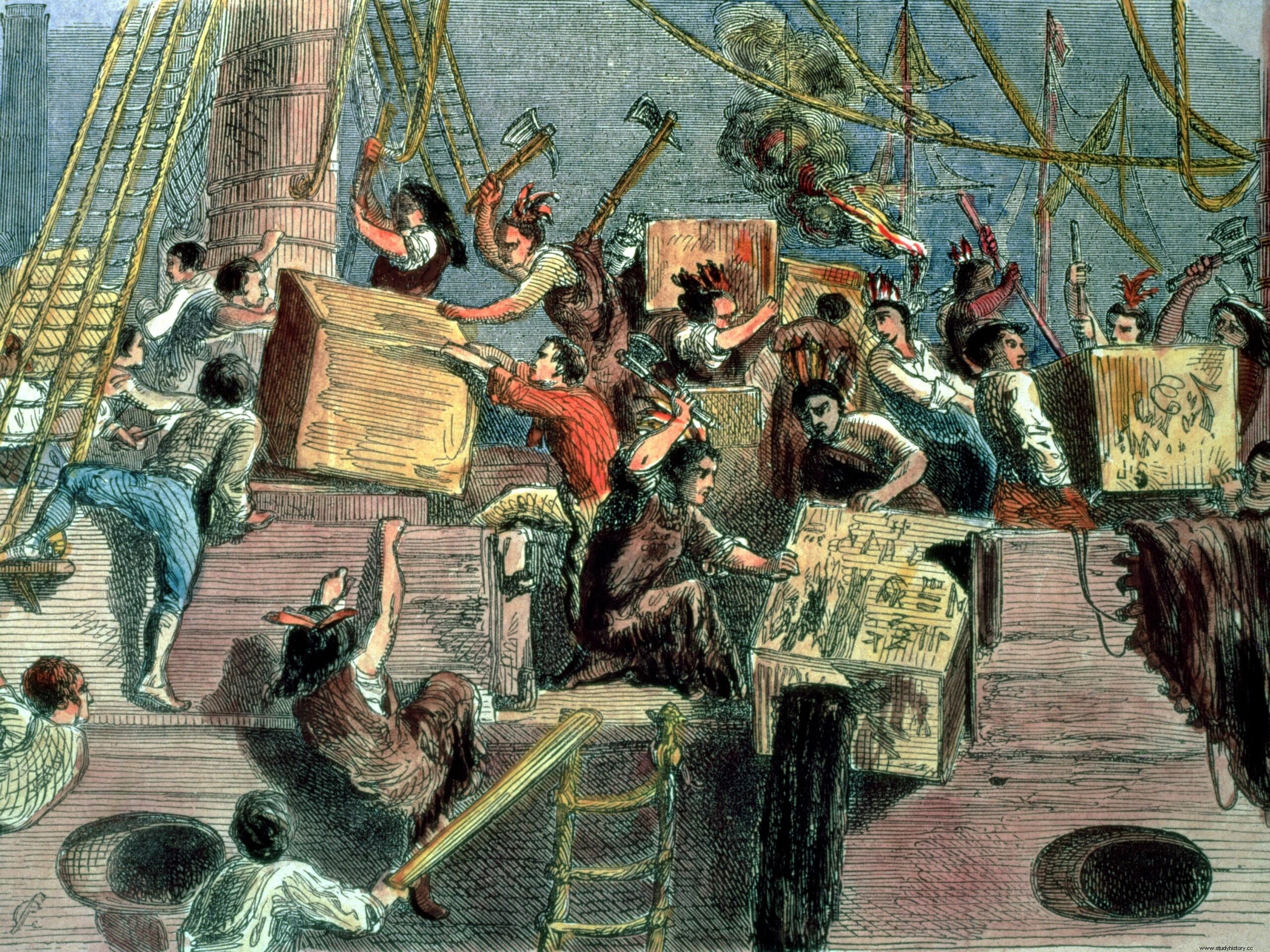
This led to the Boston Tea Party (December 16, 1773). The group led by Samuel Adams boarded the ship and dumped tea worth 10,000 XNUMX pounds into the water.
In retaliation, the British adopted the "Intolerable Acts 1774"- Public meetings in the town halls are closed
- Boston Harbor Closed
- Compensation for dumped tea is required
- Quebec Act-Extended borders for British-ruled Quebec
- In response, the Patriots began training militias for the impending battle with the British.
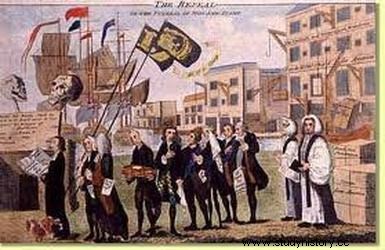
Between 1774 and 1789, the Continental Congress served as the 13 colonies of the United States and the government of the United States since. The first continental congress of colonial representatives was convened in 1774 in response to a series of actions by the British government against colonialism to counter new tax rates. The Continental Conference was held after the outbreak of the American Civil War (1775-83) in 1775. In 1776, he took an important step, declaring the United States' independence from Britain. In the years that followed, Congress approved the first national constitution, the federal clause. The states under the title of this federation were governed until they were replaced by the current UC constitution in 1789.
Hostilities break out - American Revolutionary War begins
In April 1775 the battles began (Lexington and Concord)
- The Continental Army was led by General George Washington.
- They had support and control of the countryside, while cities were bitterly disputed.
- King George III was asked by Congress in July to stop oppressive laws and avoid full war, but he declared Congress a traitor.
Many colonial-rich merchants in cities who benefited from trade policy continued to favor British rule. They were called loyalists.- Meanwhile, a pamphlet written by Thomas Paine was widely distributed in 1775-76.
- It advocated independence in simple language with convincing arguments and justifications.
By early 1776, in all 13 colonies, the Patriots had overthrown their existing governments, closed courts, and expelled British officials. They had elected legislators and new constitutions were being drafted. They declared that they were states now, and not colonies.
2. continental congress
On July 4, 1776, the Declaration of Independence was passed in Philadelphia. We believe these truths are self-evident:that all human beings are created equal. . . . "quoted" Thomas Jefferson ". The Second Congress oversaw the war effort and the patriots were soon supported by the French Empire, which almost declared itself bankrupt by supporting the Americans. Spain and the Netherlands also supported the Americans.
The war ended with the signing of the Treaty of Paris in 1783.
- The war officially ended with the signing of this treaty
- United States independence recognized by the United Kingdom
- Around 100,000 soldiers died in the fighting, mainly due to illness.
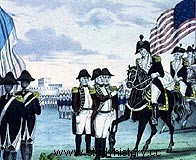
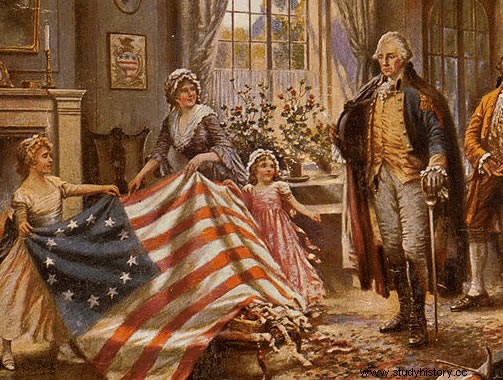
The significance of war
- Independence of US Nationalism
- Another type of state formed-mass-based, not leader-based republic
- Anti-imperialist nation
- A blueprint to unite people for a cause
- Ideas of Enlightenment Found in the Real World
- Inspired / led to other revolutions, especially French and Latin American.
- Later, the British Empire changed its policy worldwide. Pitts India Act 1784, Cornwallis reforms in India are one such example.
Although there was some criticism of the American Revolution:
- No profound change in society (like the French Revolution)
- No universal rights - only for men who own property (15-20% of the total population)
- No rights for slaves (30% of the population) or women
- Power was taken from rich white Englishmen and consolidated to rich white American men.
- The ideas were very strong, but the policy / implementation was weak.
Then the US Constitution came into the picture:
- The World's First Written Constitution (1789)
- Freedom ideals, rule of law
- Natural Rights for Men-Bill of Rights
- Separation of powers-Montesquieu
- System of controls and balances
The American Revolution had a socio-cultural impact not only on the United States but also on the world at large because of its representation of independence.
